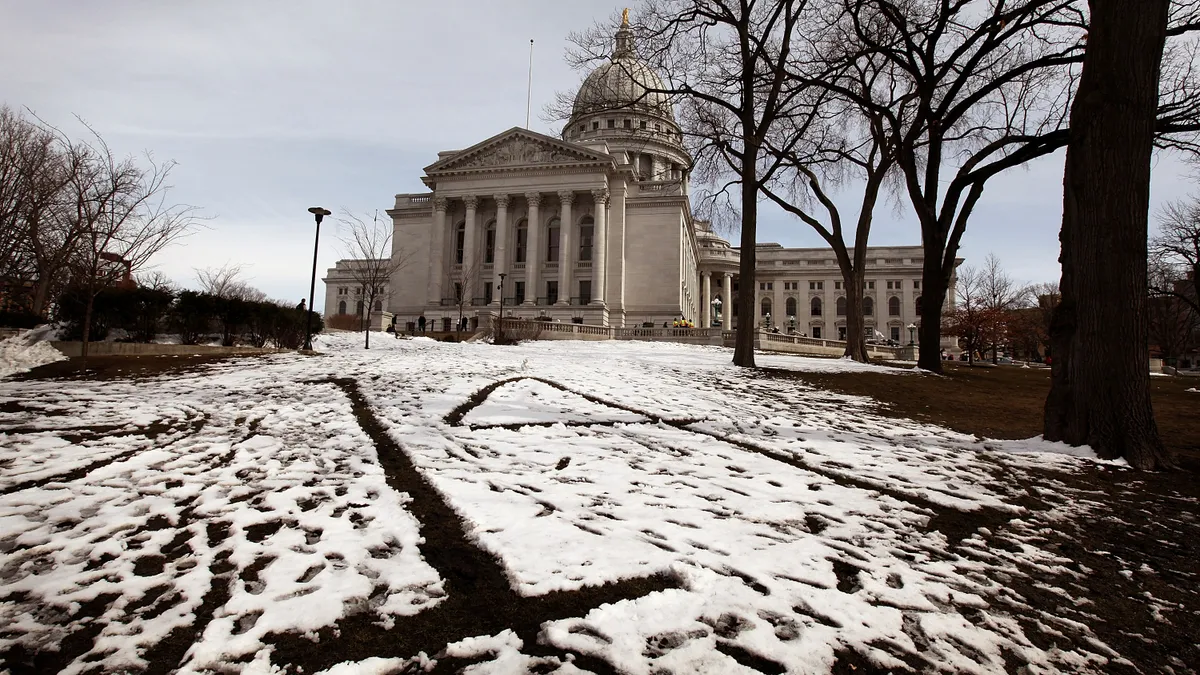Dive Brief:
- Republican lawmakers in Wisconsin have introduced a bill that would take away state student grant funding from public and technical colleges for a year if they restrict free speech. If an administrator caused the offense, then an institution would need to remove them from their role to once again be grant-eligible.
- The proposal would require these institutions to annually survey students and employees about free inquiry and whether their campuses promote self-censorship. Colleges that are found to infringe on free speech rights would need to notify applicants about these violations for the next decade.
- A free speech violation could be determined by a court, the state's Higher Educational Aids Board or a legislative committee with jurisdiction over higher ed.
Dive Insight:
The bill is another attempt from Wisconsin Republicans to regulate campus free speech, part of a national pattern of policymakers intervening in colleges' operations and widespread GOP interest in these issues.
The state for several years has been the site of contentious free speech debates. Legislation proposed in 2017 would have required colleges to suspend or expel students who shouted down campus speakers.
The bill failed, but the University of Wisconsin board of regents that year passed a resolution instituting similar consequences.
Republicans' newest bill dictates that a UW or technical school that flouts free speech more than once in a decade would have Wisconsin grants revoked for a fiscal year. The grants provide financial assistance to in-state undergraduates enrolled at least half-time in degree or certificate programs. They currently award $250 to $3,150 per student.
If a particular administrator caused the violation, then a college instead would need to remove that administrator to have their grant eligibility restored.
Institutions whose grant money is rescinded would need to pay students the same amount in financial aid from their own funds.
Colleges would need to annually survey students and staff on their thoughts on the First Amendment, academic freedom and perceptions of political bias and report those results to the legislature. They also could not create restrictive free speech rules, such as designating certain areas of campus "free speech zones," which states have been banning en masse.
Under the bill, individuals who have their free speech rights violated could seek damages from institutional governing boards. And colleges that are found to have flouted free speech would need to include a disclaimer on admissions notices for a decade that they have done so.
Some of the bill's provisions are particularly harsh and likely to be edited out, said Joe Cohn, legislative and policy director at the Foundation for Individual Rights in Education, a national civil liberties watchdog. Cohn said he was working with the bill sponsor and recently testified on the legislation in a committee hearing.
Cohn did not object to the survey provision and said allowing people to sue for damages would be helpful. While public colleges are subject to the First Amendment, it is legally challenging for individuals to be properly compensated if a college infringes on their free speech, he said. Most court cases center on institutions restricting free speech before an incident occurs, he said.
But he said the enforcement mechanisms in the bill, such as student grants being rescinded, were too severe.
"I would be surprised if those remain in the bill," Cohn said.
A spokesperson for the UW system did not respond to a request for comment on Wednesday.
The Wisconsin bill mirrors some elements of controversial legislation in Florida, which Gov. Ron DeSantis, a Republican, signed in June. The Florida law requires colleges to survey students, faculty and staff about how comfortable they are expressing their views and beliefs.









